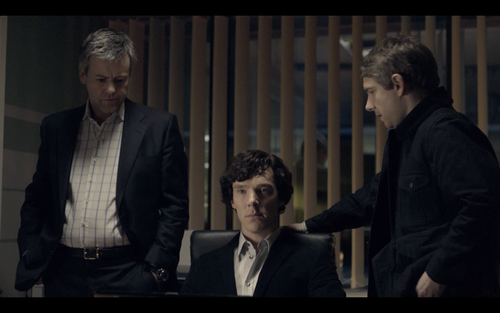
BBC Sherlock Fan Forum - Serving Sherlockians since February 2012.
- Lilythiell
- High Functioning Sociopath
 Offline
Offline 
- From: France
- Registered: May 11, 2014
- Posts: 2,371
Re: Does John prefer "machine" Sherlock?
Hum. Not what I have in mind. Why are words difficult?
Second attempt, if you don't mind?
John would not prefer a "machine" Sherlock.
But an emotional Sherlock is problematic to him.
I used "cannot", I shouldn't have. I think it would have been closer to what I think had I said that he has difficulties dealing with an emotional Sherlock. An emotional Sherlock, though difficult and out of John's comfort zone, brings out danger (the danger of facing his own emotions, maybe?) and a challenge (maybe grappling with emotions and actually dealing with them).
-------------------------------------------------------------------------
I'd be lost without my blogger.
"It’s not a ‘gang’ show, it’s the Sherlock and John show. It’s about developing their characters and their relationship, and the characters drawn into their orbit.” Steven Moffat

- RavenMorganLeigh
- Official Blogger
 Offline
Offline 
- From: Seattle, WA, USA
- Registered: December 25, 2013
- Posts: 1,575
Re: Does John prefer "machine" Sherlock?
nakahara wrote:
Liberty wrote:
It's an interesting point, but I'm not sure that John does prefer machine Sherlock. When he tells him he's a drama queen, not a problem-solver, outside Sholto's room, I think he's actually being quite perceptive and even helpful (even if he's also rude).
Do you believe that if John offered some encouraging words (like "you can do it!") or plead with Sherlock to save Sholto, the outcome would be different and Sherlock would not save Sholto? Sherlock was already putting great effort into the rescue of the Major, was it so neccessary to insult him to make his performance better? How did being treated like a lackey improve his problem-solving?
That just seems to be how John needs to frame things with Sherlock. He insults, or browbeats or nags, he complains on his blog about "the Madman"-- he can't really see Sherlock as a Positive figure.
- RavenMorganLeigh
- Official Blogger
 Offline
Offline 
- From: Seattle, WA, USA
- Registered: December 25, 2013
- Posts: 1,575
Re: Does John prefer "machine" Sherlock?
Vhanja wrote:
But John isn't grumpy when Sherlock is nice. John is grumpy because of other factors (outside circumstances, shocing reveals about Mary, situation with Magnussen, or - as in the tube scene and reunion scene - Sherlock being cruel/oblivious).
S3 is where they are the most open about their feelings of each other. Both states clearly in word that they love each other, and John is the one who takes the initiative to hug Sherlock. Personally, I think you might be seeing a pattern that isn't there. I don't see a connection with Sherlock being kind and nice leading to John being grumpy. I think it's more that S3 has a bigger roller-coaster of emotions for both of them, so we get to see both Sherlock being milder and kinder than before, and John being angrier an stressed more. But the two of them aren't linked as I see it. It's not Sherlock being kind that triggers John's anger.
Errrr. John is pretty much grumpy all the time, but he's better at appearing to be a real "human". In fact, he makes an art of of appearing to be a "real human being", when he's actually just as much of an outsider as Sherlock.
- Vhanja
- One More Miracle
 Offline
Offline 
- From: Sandnes, Norway
- Registered: December 11, 2014
- Posts: 6,607
Re: Does John prefer "machine" Sherlock?
I guess this is another one of those things where I hardly recognize the John you see, Raven. Your view of John seem to be a bit too harsh and negative compared to what I see.
__________________________________________________________________________________________________________________________________________
"We'll live on starlight and crime scenes" - wordstrings

Team Hudders!
- nakahara
- Threatened Knighthood
 Offline
Offline 
- Registered: February 22, 2014
- Posts: 11,979
Re: Does John prefer "machine" Sherlock?
Lilythiell wrote:
Hum. Not what I have in mind. Why are words difficult?
Second attempt, if you don't mind?
John would not prefer a "machine" Sherlock.
But an emotional Sherlock is problematic to him.
I used "cannot", I shouldn't have. I think it would have been closer to what I think had I said that he has difficulties dealing with an emotional Sherlock. An emotional Sherlock, though difficult and out of John's comfort zone, brings out danger (the danger of facing his own emotions, maybe?) and a challenge (maybe grappling with emotions and actually dealing with them).
But why that is, I wonder? Why is John so unwilling to deal with an emotional side of Sherlock?
-----------------------------------
I cannot live without brainwork. What else is there to live for? Stand at the window there. Was there ever such a dreary, dismal, unprofitable world? See how the yellow fog swirls down the street and drifts across the dun-coloured houses. What could be more hopelessly prosaic and material? What is the use of having powers, Doctor, when one has no field upon which to exert them?

- •
- Lilythiell
- High Functioning Sociopath
 Offline
Offline 
- From: France
- Registered: May 11, 2014
- Posts: 2,371
Re: Does John prefer "machine" Sherlock?
I think that the fact he himself struggles dealing with his own emotions makes him unwilling to deal with others -and in particular, others who also seem to struggle with them be it for their sheer strength or his unfamiliarity to them.
-------------------------------------------------------------------------
I'd be lost without my blogger.
"It’s not a ‘gang’ show, it’s the Sherlock and John show. It’s about developing their characters and their relationship, and the characters drawn into their orbit.” Steven Moffat

- SusiGo
- The game is never over (moderator)
 Offline
Offline 
- From: Germany
- Registered: June 5, 2012
- Posts: 22,969
Re: Does John prefer "machine" Sherlock?
Yes, this is true. Just think of John's words in the Underground car: "I find it difficult, this kind of thing." John is mostly unable to talk about his feelings, be it with his therapist or with Mrs Hudson he does not visit in the years after Sherlock's death or with Sherlock (the park bench). And as for Mary - we only get the awkward reconciliation scene in HLV which is not much.
So we have two men who have problems to openly deal with their emotions, not just one. Which does not make it easier for them.
------------------------------
"To fake the death of one sibling may be regarded as a misfortune; to fake the death of both looks like carelessness." Oscar Wilde about Mycroft Holmes
"It is what it is says love." (Erich Fried)
“Enjoy the journey of life and not just the endgame. I’m also a great believer in treating others as you would like to be treated.” (Benedict Cumberbatch)

- Vhanja
- One More Miracle
 Offline
Offline 
- From: Sandnes, Norway
- Registered: December 11, 2014
- Posts: 6,607
Re: Does John prefer "machine" Sherlock?
SusiGo wrote:
Yes, this is true. Just think of John's words in the Underground car: "I find it difficult, this kind of thing." John is mostly unable to talk about his feelings, be it with his therapist or with Mrs Hudson he does not visit in the years after Sherlock's death or with Sherlock (the park bench). And as for Mary - we only get the awkward reconciliation scene in HLV which is not much.
So we have two men who have problems to openly deal with their emotions, not just one. Which does not make it easier for them.
This is how I view it as well. That is why I think they are both a bit dysfunctional when it comes to emotions, only in
slightly different ways.
__________________________________________________________________________________________________________________________________________
"We'll live on starlight and crime scenes" - wordstrings

Team Hudders!
- nakahara
- Threatened Knighthood
 Offline
Offline 
- Registered: February 22, 2014
- Posts: 11,979
Re: Does John prefer "machine" Sherlock?
Interesting meta that touches the subject nicely:
-----------------------------------
I cannot live without brainwork. What else is there to live for? Stand at the window there. Was there ever such a dreary, dismal, unprofitable world? See how the yellow fog swirls down the street and drifts across the dun-coloured houses. What could be more hopelessly prosaic and material? What is the use of having powers, Doctor, when one has no field upon which to exert them?

- •
- SusiGo
- The game is never over (moderator)
 Offline
Offline 
- From: Germany
- Registered: June 5, 2012
- Posts: 22,969
Re: Does John prefer "machine" Sherlock?
Yes, indeed some interesting thoughts.
------------------------------
"To fake the death of one sibling may be regarded as a misfortune; to fake the death of both looks like carelessness." Oscar Wilde about Mycroft Holmes
"It is what it is says love." (Erich Fried)
“Enjoy the journey of life and not just the endgame. I’m also a great believer in treating others as you would like to be treated.” (Benedict Cumberbatch)

- Vhanja
- One More Miracle
 Offline
Offline 
- From: Sandnes, Norway
- Registered: December 11, 2014
- Posts: 6,607
Re: Does John prefer "machine" Sherlock?
Interesting thoughts, indeed. I think there is a difference in understanding human nature in such a way that you can use it to manipulate or analyse other, and understand in a way that you can relate to it, empathise with others an be able to communicate in a way that shows this.
Sherlock is a master at the first one, and quite bad at the second one. (So bad, in fact, that it was this bit that made me believe for a while that he was somewhere on the autism spectre).
__________________________________________________________________________________________________________________________________________
"We'll live on starlight and crime scenes" - wordstrings

Team Hudders!
- RavenMorganLeigh
- Official Blogger
 Offline
Offline 
- From: Seattle, WA, USA
- Registered: December 25, 2013
- Posts: 1,575
Re: Does John prefer "machine" Sherlock?
nakahara wrote:
Interesting meta that touches the subject nicely:
Very pertinent to the discussion.
And I agree with the meta. I think that in Fandom, there's a tendency to want to see Sherlock as "Spock", or as Austistic, or even devoid of the ability to understand or even feel emotion-- and I think it's because of taking *John's comments and (sometimes insults and sly digs) as Gospel-- and John is an unreliable narrator.
Last edited by RavenMorganLeigh (August 17, 2015 6:19 pm)
- Vhanja
- One More Miracle
 Offline
Offline 
- From: Sandnes, Norway
- Registered: December 11, 2014
- Posts: 6,607
Re: Does John prefer "machine" Sherlock?
RavenMorganLeigh wrote:
And I agree with the meta. I think that in Fandom, there's a tendency to want to see Sherlock as "Spock", or as Austistic, or even devoid of the ability to understand or even feel emotion-- and I think it's because of taking *John's comments and (sometimes insults and sly digs) as Gospel-- and John is an unreliable narrator.
Even though I know now Sherlock isn't on the autism spectrum, it was not John's comments that made me believe for a while that he was. It was Sherlock's own behavior and statements.
__________________________________________________________________________________________________________________________________________
"We'll live on starlight and crime scenes" - wordstrings

Team Hudders!
- nakahara
- Threatened Knighthood
 Offline
Offline 
- Registered: February 22, 2014
- Posts: 11,979
Re: Does John prefer "machine" Sherlock?
Vhanja wrote:
Interesting thoughts, indeed. I think there is a difference in understanding human nature in such a way that you can use it to manipulate or analyse other, and understand in a way that you can relate to it, empathise with others an be able to communicate in a way that shows this.
Sherlock is a master at the first one, and quite bad at the second one. (So bad, in fact, that it was this bit that made me believe for a while that he was somewhere on the autism spectre).
Psychopaths often manipulate the feelings of others without understanding emotions or empathising with anyone, yet I think we can agree that Sherlock is not a psychopath. Personally, I´m under an impression that he understands emotions in a normal way, like any other person - what makes him look as if he was bad at it is his brutal honesty and (as I see it) his deliberate ignorance of social boundaries other people adhere to. This characteristics saves him from being unneccessarily hurt. Because when Sherlock tries to display his emotions too openly, this happens:
He gets dismissed as if he really doesn´t have any feelings.
So he deliberately maintains this "I don´t understand those puny emotions" image.
Still, when he´s alone and has nothing to loose, he emotes quite fine, like any other person would. Here´s his reaction on realisation that Sarah and John were kidnapped in TBB:
He is disturbed when old lady is killed in TGG:
And the most famous example - tears when nobody is close enought to witness them:
I don´t think he is especially cold or weird when emotions are involved. He is just forced to mask it by strange circumstances of his life.
-----------------------------------
I cannot live without brainwork. What else is there to live for? Stand at the window there. Was there ever such a dreary, dismal, unprofitable world? See how the yellow fog swirls down the street and drifts across the dun-coloured houses. What could be more hopelessly prosaic and material? What is the use of having powers, Doctor, when one has no field upon which to exert them?

- •
- Vhanja
- One More Miracle
 Offline
Offline 
- From: Sandnes, Norway
- Registered: December 11, 2014
- Posts: 6,607
Re: Does John prefer "machine" Sherlock?
First example:
I don't see this at all as John dismissing Sherlock's feeling. This is where Sherlock tries to break the ice by using humour. That isn't good enough for John, he wants a proper apology. Which I understand and agree with (and I love this scene, how John is strong enough in himself to not give in by the slighest attempt to "break the ice" by Sherlock. Here Sherlock actually has to dig deep enough to give a proper apology, which he bothces in his own way, of course).
Second and third example:
No one disagrees with Sherlock being able to feel. On the contrary, that is a big part of the show itself - how Sherlock tries to be the "sosiopath", but fails spectacularly because he feels so much. (And I believe his cold persona was created to protect himself from his own strong feelings). Not to mention how he fails to live up to his brother's standard of "caring is not an advantage".
Fourth example:
This is probably (and unfortunately) fake tears. Confirmed by Moffat as well. No, John can't see the tears, but if you can get yourself to cry, your voice will shaking more, and you will sniffle - things John can hear through the phone.
__________________________________________________________________________________________________________________________________________
"We'll live on starlight and crime scenes" - wordstrings

Team Hudders!
- nakahara
- Threatened Knighthood
 Offline
Offline 
- Registered: February 22, 2014
- Posts: 11,979
Re: Does John prefer "machine" Sherlock?
Vhanja wrote:
First example:
I don't see this at all as John dismissing Sherlock's feeling. This is where Sherlock tries to break the ice by using humour. That isn't good enough for John, he wants a proper apology. Which I understand and agree with (and I love this scene, how John is strong enough in himself to not give in by the slighest attempt to "break the ice" by Sherlock. Here Sherlock actually has to dig deep enough to give a proper apology, which he bothces in his own way, of course).
OK and what about TSOT? That weird scene where they are sitting on a park bench and John says: "Why are you suddenly so interested in another human being?", after which Sherlock answers: "I´m chatting... won´t try again."
In my eyes it was a dismissal with a D.
Vhanja wrote:
Fourth example:
This is probably (and unfortunately) fake tears. Confirmed by Moffat as well. No, John can't see the tears, but if you can get yourself to cry, your voice will shaking more, and you will sniffle - things John can hear through the phone.
But we had a few examples of Sherlock´s fake tears in the show and they look nothing alike, IMHO. Plus, Thompson wrote this episode, not Moffat.
-----------------------------------
I cannot live without brainwork. What else is there to live for? Stand at the window there. Was there ever such a dreary, dismal, unprofitable world? See how the yellow fog swirls down the street and drifts across the dun-coloured houses. What could be more hopelessly prosaic and material? What is the use of having powers, Doctor, when one has no field upon which to exert them?

- •
- Vhanja
- One More Miracle
 Offline
Offline 
- From: Sandnes, Norway
- Registered: December 11, 2014
- Posts: 6,607
Re: Does John prefer "machine" Sherlock?
John is suprrised, because Sherlock has never done that type of "chatting" before. That scene doesn't come across to me as John dismissing Sherlock's feelings, more that he is surprised. And probably a bit suspicious, which is understandable considering how Sherlock has never done or said anything like that without ulteriour motives before.
Also, Sherlock doesn't come across as very emotional in that scene, more curious. (You could even argue that Sherlock is the one dismissing John's feelings here, because this is one of the few times John tries to open up and tell Sherlock how much Sherlock means to him, and Sherlock just leaves).
Even though Thompson wrote the episode, Moffat is of course well-known with what is going on. But even if the tears were not fake, there still isn't anyone who has denied that Sherlock can feel.
I never thought his problem with emotions was that he didn't feel them. More that he was unable to understand how his actions and words could affect others (unless he was using it as a conscious manipulation), unable to understand social conduct, and unable to show empathy.
All of these areas seem to improve somewhat, but even as far out in the series as TSoT, you see Sherlock being bewildered and honestly not understanding why his words in his speech made people cry. And as late as HLV we see him manipulating someone in the coldest way possible through emotions (Janine), and he doesn't see even the slightest problem with this.
__________________________________________________________________________________________________________________________________________
"We'll live on starlight and crime scenes" - wordstrings

Team Hudders!
- nakahara
- Threatened Knighthood
 Offline
Offline 
- Registered: February 22, 2014
- Posts: 11,979
Re: Does John prefer "machine" Sherlock?
Vhanja wrote:
John is suprrised, because Sherlock has never done that type of "chatting" before. That scene doesn't come across to me as John dismissing Sherlock's feelings, more that he is surprised. And probably a bit suspicious, which is understandable considering how Sherlock has never done or said anything like that without ulteriour motives before.
OK, I can buy suspicious John - Sherlock pulled his leg many times before, that´s true.
Vhanja wrote:
Also, Sherlock doesn't come across as very emotional in that scene, more curious. (You could even argue that Sherlock is the one dismissing John's feelings here, because this is one of the few times John tries to open up and tell Sherlock how much Sherlock means to him, and Sherlock just leaves).
But Sherlock left only when John started praising Mary and how she magnificently changed his life.... it was painful for him to hear this. So personally, I see him as emotional in this scene.
Vhanja wrote:
All of these areas seem to improve somewhat, but even as far out in the series as TSoT, you see Sherlock being bewildered and honestly not understanding why his words in his speech made people cry. And as late as HLV we see him manipulating someone in the coldest way possible through emotions (Janine), and he doesn't see even the slightest problem with this.
But HLV is not the best of examples. Sherlock only lied to Janine in an effort to stop the hateful blackmailer. There was nothing personal in it, no gain for Sherlock.
How come people can accept Mary´s murder attempt at Sherlock´s life as neccessary and understandable and in the same time they condemn this much more beningn deed that was also committed out of neccessity?
-----------------------------------
I cannot live without brainwork. What else is there to live for? Stand at the window there. Was there ever such a dreary, dismal, unprofitable world? See how the yellow fog swirls down the street and drifts across the dun-coloured houses. What could be more hopelessly prosaic and material? What is the use of having powers, Doctor, when one has no field upon which to exert them?

- •
- Vhanja
- One More Miracle
 Offline
Offline 
- From: Sandnes, Norway
- Registered: December 11, 2014
- Posts: 6,607
Re: Does John prefer "machine" Sherlock?
It's possible to understand something without agreeing to it. I have no problem understanding why Sherlock manipulated Janine. That doesn't change the fact that it was cold manipulation of someone else's feeling without even the slightest hint of remorse on Sherlock's side. (Perhaps a teensy-tiny one in the hospital scene).
I want to ask the question the other way around - how come all Sherlock's behaviour, no matter how cruel and manipulative, is always easily understood and defended, while as Mary (and now also John) seem to get the flak and being highly criticized for the tiniest thing. None of those two get even a hint of the same stretch of tolerance that Sherlock gets.
Last edited by Vhanja (August 17, 2015 9:32 pm)
__________________________________________________________________________________________________________________________________________
"We'll live on starlight and crime scenes" - wordstrings

Team Hudders!
- nakahara
- Threatened Knighthood
 Offline
Offline 
- Registered: February 22, 2014
- Posts: 11,979
Re: Does John prefer "machine" Sherlock?
Vhanja wrote:
I want to ask the question the other way around - how come all Sherlock's behaviour, no matter how cruel and manipulative, is always easily understood and defended, while as Mary (and now also John) seem to get the flak and being highly criticized for the tiniest thing. None of those two get even a hint of the same stretch of tolerance that Sherlock gets.
It is possible to forgive Sherlock, because he knows shame and is able to apologise when he feels he overdid it - while Mary never apologised for any bad thing she has done.
-----------------------------------
I cannot live without brainwork. What else is there to live for? Stand at the window there. Was there ever such a dreary, dismal, unprofitable world? See how the yellow fog swirls down the street and drifts across the dun-coloured houses. What could be more hopelessly prosaic and material? What is the use of having powers, Doctor, when one has no field upon which to exert them?

- •

